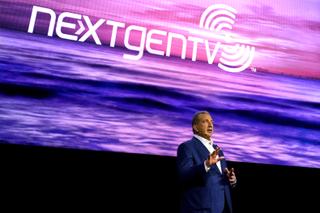LG Suspends 2024 Lineup of U.S. NextGen TVs; Industry Responds
While the company is pulling the models, the industry remains hopeful a solution is possible

LG Electronics Inc. has told the FCC that it would suspend manufacturing and marketing of next year’s NextGen TV models for the U.S. due to an unfavorable patent dispute verdict rendered in July.
The move, first reported by CordCutterNews.com, is seen as a blow to the maturing of NextGen TV in the United States; however, there is a range of opinion whether the suspension is simply a temporary setback or a move with potentially more far-reaching implications.
The decision “was not made lightly, because LG has been a vocal ATSC 3.0 advocate, a strong support of local broadcasters, and a leading developer of television products with the latest NextGen TV technologies,” the company said in its Sept. 15 filing with the FCC.
In July, the jury hearing the patent infringement case brought in the Marshall Division of U.S. District Court for the Eastern District of Texas by Constellation Designs LLC concluded LG willfully infringed on the company’s patents. It recommended the consumer electronics giant compensate the patent holder in the amount of $1.68 million. A press release issued following the verdict pegged the per unit compensation at $6.75—as did LG’s FCC filing.
A spokesperson for LG could not be reached, and others at the company did not respond to a request for additional comment before publication.
At the moment, the case has moved to a post-judgment phase during which the judge will decide on future royalty payments –in the event the company resumes NextGen TV production, said Jason Cassady, Constellation Designs’ lead trial counsel and a partner at Dallas-based intellectual property and business litigation firm Caldwell, Cassady & Curry. The firm is requesting $6.75 per unit going forward.
No other NextGen TV vendors have licensed Constellation Designs patents, he added, although at press time it was unclear whether other NextGen TV makers use technology that relies on the company’s patents.
Members of the TV industry contacted for this story rallied around LG, expressing the hope the royalty issue could be resolved so the company would continue its long-standing support for NextGen TV market and technology development.
“LG’s decision to suspend support for NextGen TV products in 2024 because of an ongoing patent dispute is unfortunate, but we are hopeful that the matter can be resolved,” said Anne Schelle, managing director of the Pearl TV broadcast group. “In the meantime, we continue to project that total NextGen TV sales will cumulatively top 10 million units by year end.”
Madeleine Noland, president of the Advanced Television Systems Committee, referenced the cooperation patent holders normally exhibit in creating licensing programs that provide access to inventions and promote broad deployment of products conforming to its standards. “While we cannot comment on the specifics of the LG case, we trust that all parties involved are actively pursuing solutions to bring the benefits of next-generation broadcasting on future LG television models to U.S. viewers,” she said.
The Public Media Venture Group, a nonprofit business development group with 32 public media members, remains a strong proponent of 3.0 despite LG’s decision. “PMVG continues to believe that ATSC 3.0 and NextGen TV dramatically increase the potential for public service, and we and our stations will continue to deploy this technology to service our viewers,” said PMVG CEO Marc Hand. “Given the enormous public service potential of NextGen TV, we remain hopeful that the forward momentum will continue.”
Jerald Fritz, executive vice president for strategic and legal affairs, at ONE Media, a wholly owned subsidiary of Sinclair Broadcast Group, echoed points LG raised in its FCC filing.
“We are obviously disappointed at LG’s decision, but we firmly believe that this is an outlier-decision that will be reversed on appeal,” said Fritz. “The per-unit price for this one patent family is more than double the rate for close to 1,000 Standard Essential Patents [SEPs] in the Avanci patent pool. We believe that dramatic difference will be addressed on appeal and bring back LG as a significant supplier of ATSC 3 televisions.”
LG pointed out in its FCC filing that the Avanci patent pool accounts for 80% of all 3.0 SEPs, which currently commands a royalty fee of $2.75 and is capped at $3.00. Similarly, the license fee for the VIA LA patent pool involving other 3.0-relevant patents that “improve the television viewing experience” is set at $2.75 per unit, LG said in the filing.
“CD [Constellation Designs] has not made a commitment to license its patents under RAND [reasonable and non-discriminatory] conditions and has not contributed its patents to any patent pool,” the company said in its filing.
Get the TV Tech Newsletter
The professional video industry's #1 source for news, trends and product and tech information. Sign up below.
Phil Kurz is a contributing editor to TV Tech. He has written about TV and video technology for more than 30 years and served as editor of three leading industry magazines. He earned a Bachelor of Journalism and a Master’s Degree in Journalism from the University of Missouri-Columbia School of Journalism.

